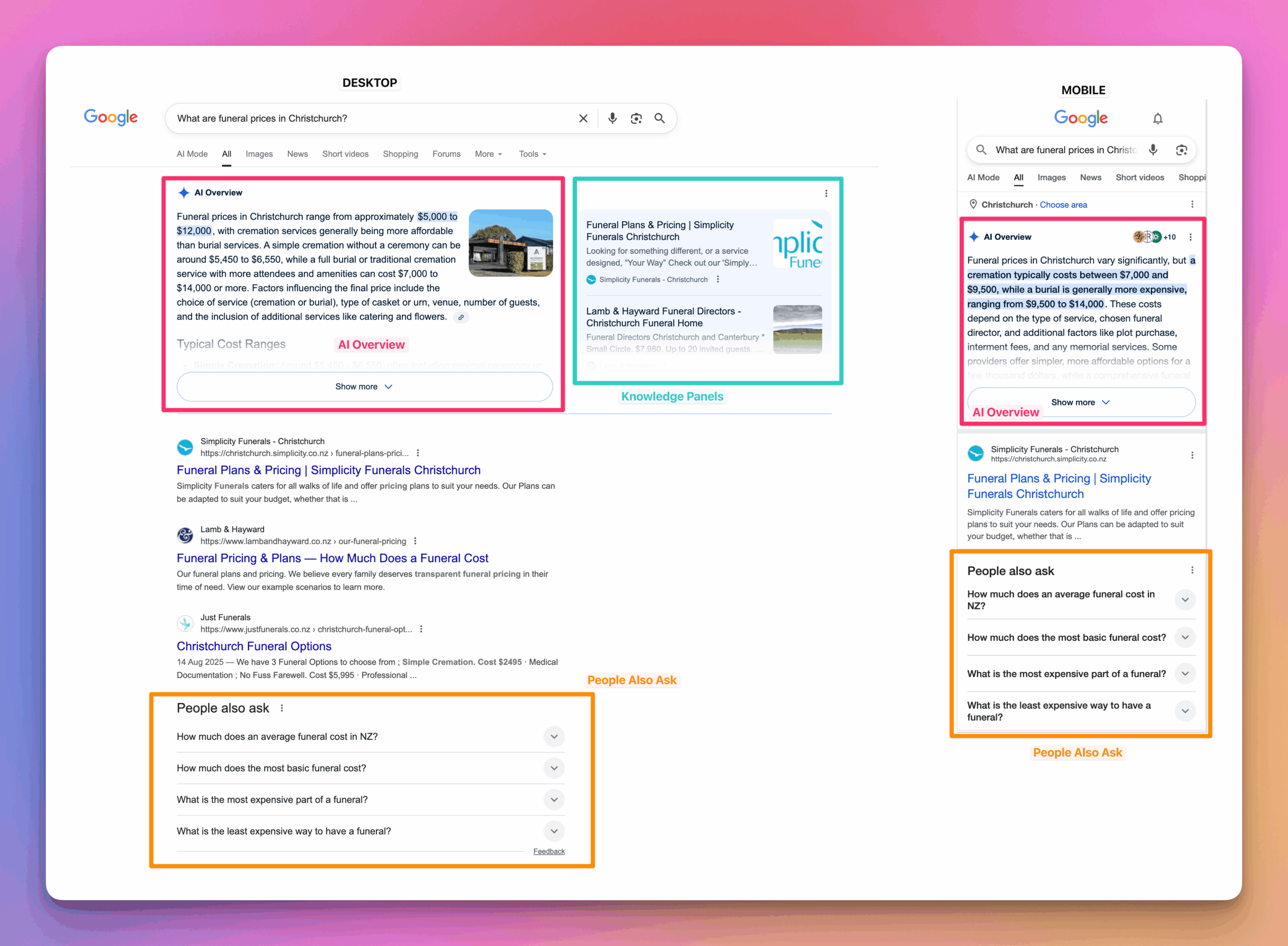Families often come to a funeral home website with one thing in mind: they need an answer, and they need it quickly. It might be “How much does a funeral cost in Auckland?”, “Can we livestream a service for relatives overseas?”, or “What paperwork do we need before a funeral?”.
When people are grieving, or just planning ahead, they don’t want to dig through menus or marketing fluff. They want clear, honest information they can trust. That’s where FAQs (frequently asked questions) come in, and why they’re one of the most useful tools on your website.
But there’s another layer. FAQs also help your website show up more often in Google, especially when people use voice search or ask very specific questions. This is part of something called Answer Engine Optimisation (AEO). Sounds technical, but in plain English it’s just about writing answers in a way that Google, Siri, and Alexa can understand and share out loud.
Let’s unpack this a little more.
What is AEO in plain English?
You’ve probably seen those quick answer boxes at the top of Google, or maybe asked your phone “What’s the weather tomorrow?” and had it read the answer back. That’s AEO in action.
If someone searches “How much is a funeral in Christchurch?”, Google looks for a page with a clear, direct answer. If your website provides it, Google might feature your response in a box at the top, or even read it out when someone uses voice search, which is gaining in popularity.
So AEO isn’t about stuffing keywords. It’s about writing in the way families actually ask questions and giving them straightforward answers.
Why FAQs are crucial for funeral websites
From our work with funeral homes, we know families usually want answers about five things:
- Costs: “How much does it cost for a burial versus a cremation?”
- Timeframes: “How soon after someone passes can we hold the funeral?”
- Location/venue options: “Can we choose a venue that has special meaning for our family/whānau?”
- Cultural traditions: “Can we include our whānau’s tikanga in the service?”
- Paperwork: “What documents do we need to complete before cremation?”
FAQs let you answer these clearly, in your own words, right on your website. That helps families feel informed and reassured, and it builds trust in your funeral home.
There’s a business upside too. Well-structured FAQs with a little behind-the-scenes code (called schema markup) can appear in Google’s “People Also Ask” boxes. This means you’re visible not just for your name, but for the real questions people are typing into Google in your area.
Making FAQs work (and what to watch out for)
Not all FAQs are created equal. Here are the mistakes we see most often:
- Marketing fluff: Answers that read like sales pitches. Families want information, not a hard sell.
- Duplicate questions: Trying to cover every variation (“best funeral home in Auckland” vs “best funeral home on the North Shore”). Google sees this as bloat, not value.
- Wrong focus: Chasing “cheapest funeral home” when the better question is “funeral costs in Auckland.” The latter is what people actually search for.
- All in one place: A single FAQ page is fine, but you’ll get better results if you place FAQs on the right pages. Pricing questions belong on your Pricing page, cultural questions on Services, livestream questions on Notices or Livestreams.
How to write FAQs that work
If you want your FAQs to serve families and help with search, here’s the recipe:
- Start with the real question — write it exactly how someone would say it into Google.
- Give the direct answer first — short, clear, factual.
- Add context after — a gentle explanation of how you help, without turning it into an advert.
- Place FAQs on the right pages — pricing FAQs on pricing, cremation FAQs on cremation, etc. Google recommends this, and so do we.
- Use schema markup — the hidden code that signals to Google, “this is an FAQ.”
A quick example
Instead of:
“Who is the cheapest funeral home in Auckland?”
Try:
“How much does a funeral cost in Auckland?”
Answer:
“Most funerals in Auckland cost between $8,000 and $11,000 depending on choices like burial or cremation. We provide clear, itemised quotes so there are no surprises.”
That way, families get the clarity they need, and your website has a much better chance of being the one Google highlights.
What these FAQs look like in Google

If you’re wondering what this looks like in practice, here’s a real example of how Google displays answers:
- AI Overview (top of the page): This is where Google gives a short, spoken-style answer to a question like “What are funeral prices in Auckland?”. It pulls content from different websites and presents it as a summary.
- Knowledge Panels (right-hand side): These show brand or business information that Google recognises, such as your funeral home’s services or pricing pages.
- People Also Ask (accordion box further down): These are common follow-up questions. With well-structured FAQs, your answers can appear directly here.
This is exactly where Answer Engine Optimisation (AEO) comes into play. By writing clear FAQs on your own website, you give Google something useful to feature in these sections. Families get quick, accurate answers, and your website gets more visibility.
The bigger picture: from FAQs to strategy
FAQs are one of the quickest wins you can make on your website. But they’re not the whole picture.
You might already rank well when someone searches your funeral home by name, but what about when they search “funeral pricing Christchurch” or “cremation Tauranga”? If your site doesn’t answer those questions, you’re missing out on families who haven’t chosen a provider yet.
That’s why we created our Local Search & Website Opportunity Audit. It looks at what families in your area are searching for, how your competitors show up, and where your site could be capturing more of that demand. It’s a simple way to see where you stand — and where the opportunities are.
Wrapping up
Done right, FAQs are a win-win. Families get the clear, practical answers they’re looking for, and your funeral home gets found more often in search. They reduce phone calls, build trust, and make your website more useful.
The key is to start small: take the most common questions you hear every week, and add them — clearly and honestly — to the right pages of your site.
And if you’re ready to go a step further, our audit will give you a roadmap for how your whole digital presence can do the same.
Want to know what families are searching for in your area, and how to show up more often? Ask us about our Local Search & Website Opportunity Audit, or let’s start by reviewing your website’s FAQs.

